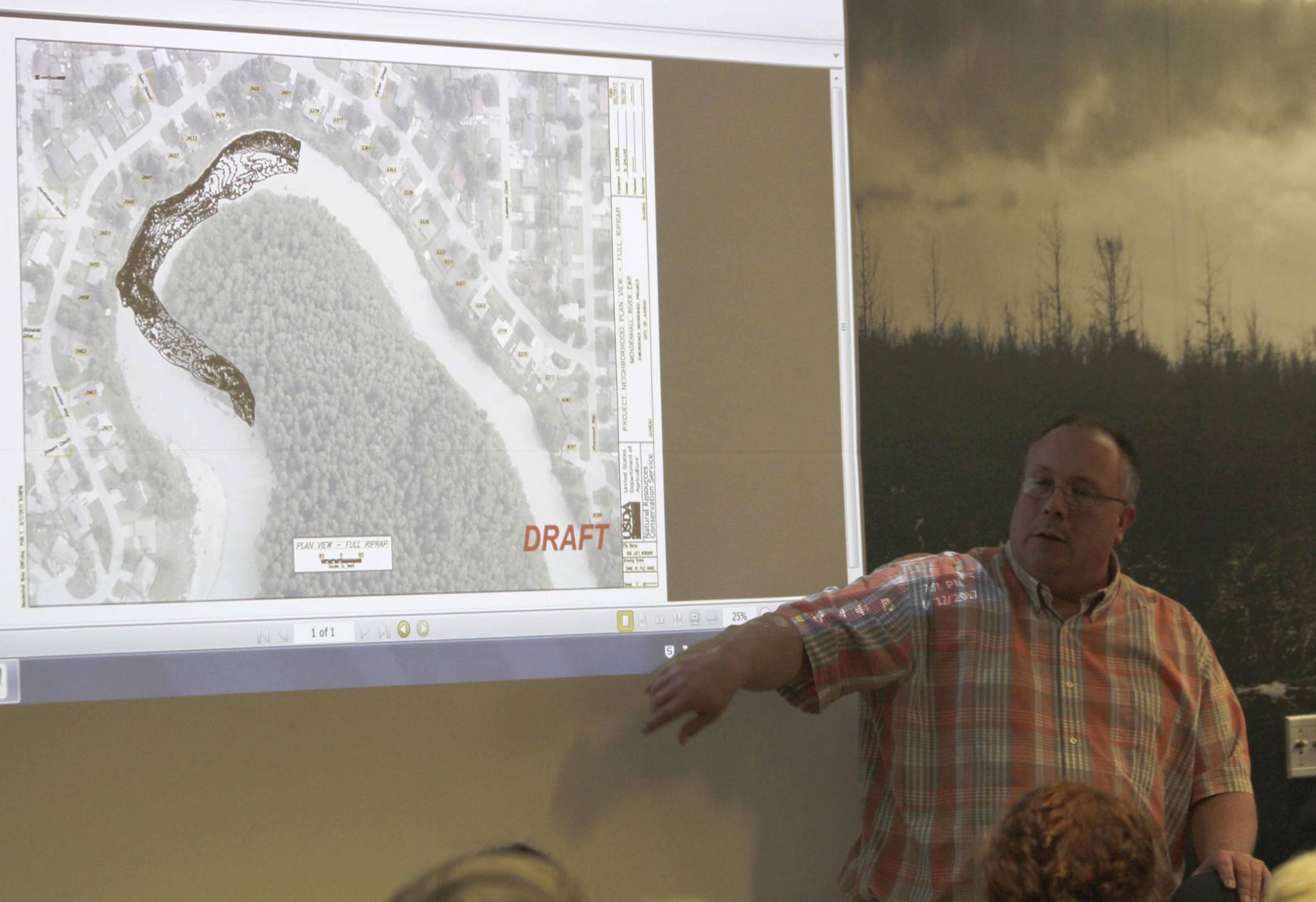In 2013, the City and Borough of Juneau contacted the Natural Resources Conservation Service (NRCS) to look into erosion along Mendenhall River.
The river was putting properties at risk as the riverbank erodes little by little, with one home facing what State Conservation Engineer for NRCS Brett Nelson called a serious problem. As he’s been further evaluating the area and drawing up a plan, the risk has spread.
“The problem grew from one home,” Nelson said. “Now there’s at least four homes that have a very, very serious problem. Like, potentially could lose their homes in as little as one more event.”
A full room of attendees at Monday’s Committee of the Whole meeting gasped as Nelson finished that thought. The city, however, is torn between wanting to act quickly and looking out for the interests of other homeowners in the area.
Nelson has gone through this process about a dozen times before, of shoring up riverbanks to stop erosion and save properties. It has always worked the same, with the federal government (the NRCS is backed by the Department of Agriculture) covering 75 percent of the cost. The local government is responsible to raise the remainder of the cost.
This particular project is estimated to cost more than $7.7 million, meaning the city has to come up with $1.9 million, plus administrative costs and permitting costs that raise that total to $2.2 million. With 28 lots in the affected area — along Meander Way near Thunder Mountain High School — if the cost were divided up evenly among the property owners, each property owner would give $78,534 to the project.
In April of this year, the CBJ reached out to property owners in the affected area, and 20 of the 25 property owners who responded to the survey said they were in support of the city going forward with NRCS coming in and doing the project. With only a handful of these properties affected, though, some landowners are against spending that much money on something that won’t help them.
City Manager Rorie Watt lamented the catch-22 at Monday night’s meeting.
“It would be very hard to impose a $78,000 assessment on an unwilling owner,” Watt said, “and it would be very hard to walk away from a project that 20 owners very badly want to do, that the federal government’s willing to pay 75 percent of.”
The Committee of the Whole discussed the issue for nearly an hour before voting to have city staff look into getting the project off the ground. The motion passed by a 5-4 margin, with Mayor Ken Koelsch and Assembly members Maria Gladziszewski, Loren Jones, Jesse Kiehl and Debbie White voting for it.
Assembly member Jerry Nankervis, who voted against it, said he wanted to take the process a little slower and look for other solutions to funding, including a Capital Improvement Plan that the city could fund. White disagreed, imploring the city to move quickly in order to save the property at risk.
Starting in 2011, the Mendenhall River has been experiencing large floods due to increased amounts of dammed-up glacial meltwater releasing all at once. Director of Public Works Roger Healy said that because of these floods, known as Jökulhlaup, the river changes every year.
“It has been, because of the glacier, quite a dynamic environment there,” Healy said.
Nelson and NRCS staffers have been working on designing the project already, and have a preliminary design in place. This won’t be finalized until the federal government appropriates the funds, but the design leans heavily on one approach.
That approach, Nelson said, is to line large rocks (known as riprap) along the sides of the river. Over time, this group of rocks will fill with soil and sediment from the river and plants will begin to grow and form root systems that hold the bank better in place. There might be chain-link fences along the banks as well and there will be some excavation to reduce the slope of the riverbank, but the project (as currently designed) will lean heavily on riprap.
This design process has all been done for free. Juneau Emergency Programs Director Tom Mattice said he appreciates the way NRCS has done hours of legwork for no cost to the city, and said working through them will likely be the city’s best option in combating the erosion on the river.
“They’ve already designed and engineered it for free,” Mattice said. “That’s why we’re here, because we have the opportunity to get into the lowest cost to define the project and also the lowest cost to deliver the process to help the homeowners.”
• Contact reporter Alex McCarthy at alex.mccarthy@juneauempire.com.

